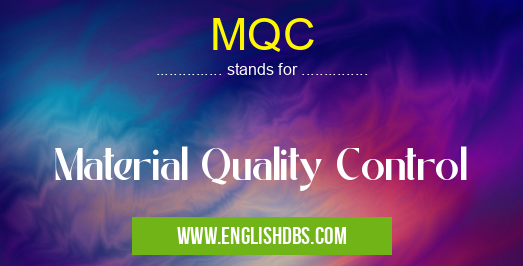What does MQC mean in QUALITY ASSURANCE & CONTROL
MQC stands for Material Quality Control, a critical process in various industries to ensure the quality and consistency of raw materials used in manufacturing. It involves a systematic set of inspections, tests, and analyses to assess the characteristics and properties of materials before they are incorporated into finished products.

MQC meaning in Quality Assurance & Control in Miscellaneous
MQC mostly used in an acronym Quality Assurance & Control in Category Miscellaneous that means Material Quality Control
Shorthand: MQC,
Full Form: Material Quality Control
For more information of "Material Quality Control", see the section below.
Key Objectives of MQC
- Verify that materials meet specified quality standards
- Identify and prevent defects or nonconformities
- Ensure that materials are suitable for their intended use
- Maintain product quality and consistency
- Reduce production downtime and waste
- Enhance customer satisfaction and safety
Common MQC Techniques
- Visual inspection
- Dimensional measurements
- Chemical analysis
- Mechanical testing
- Electrical testing
- Non-destructive testing (NDT)
Importance of MQC
- Ensures Product Quality: MQC helps prevent defective products from reaching customers, ensuring customer satisfaction and reducing the risk of product recalls.
- Reduces Production Costs: By identifying and eliminating nonconforming materials, MQC minimizes production delays, rework, and scrap.
- Improves Safety: It ensures that materials used in critical applications meet safety standards, reducing the risk of accidents or injuries.
- Compliance with Regulations: MQC helps organizations comply with industry regulations and standards related to material quality and safety.
- Enhances Reputation: MQC contributes to building a positive reputation for companies as reliable providers of high-quality products.
Essential Questions and Answers on Material Quality Control in "MISCELLANEOUS»QUALITY"
What is Material Quality Control (MQC)?
Material Quality Control (MQC) is a process that ensures that materials used in the manufacturing of products meet established quality standards. It involves testing and inspecting materials to verify their physical, chemical, and mechanical properties.
Why is MQC important?
MQC is crucial for several reasons:
- It helps prevent defective materials from being used in production, reducing the risk of product failures and ensuring customer safety.
- It optimizes manufacturing efficiency by identifying and eliminating substandard materials, minimizing waste and rework.
- It enhances product quality and reputation by ensuring that products are made from materials that meet performance and durability expectations.
What are the key elements of an effective MQC program?
Effective MQC programs typically include:
- Establishing clear quality standards and specifications for materials.
- Implementing a rigorous testing and inspection process.
- Using appropriate equipment and methodologies to conduct tests.
- Maintaining detailed records of test results and inspections.
- Taking corrective actions when deviations from quality standards are identified.
What are the benefits of implementing an MQC program?
Implementing an MQC program can provide numerous benefits, including:
- Improved product quality and reliability.
- Reduced production costs and waste.
- Enhanced customer satisfaction and loyalty.
- Protection of brand reputation.
- Compliance with industry regulations and standards.
How can companies ensure the effectiveness of their MQC program?
To ensure the effectiveness of their MQC program, companies should consider:
- Regularly reviewing and updating quality standards.
- Investing in advanced testing and inspection equipment.
- Training staff on proper testing and inspection techniques.
- Implementing a robust quality management system.
- Continuously monitoring and improving the MQC process.
Final Words: MQC is an integral part of manufacturing processes, ensuring the quality and integrity of materials used in products. By implementing comprehensive MQC procedures, organizations can minimize risks, improve efficiency, enhance product quality, and ultimately achieve customer satisfaction.
